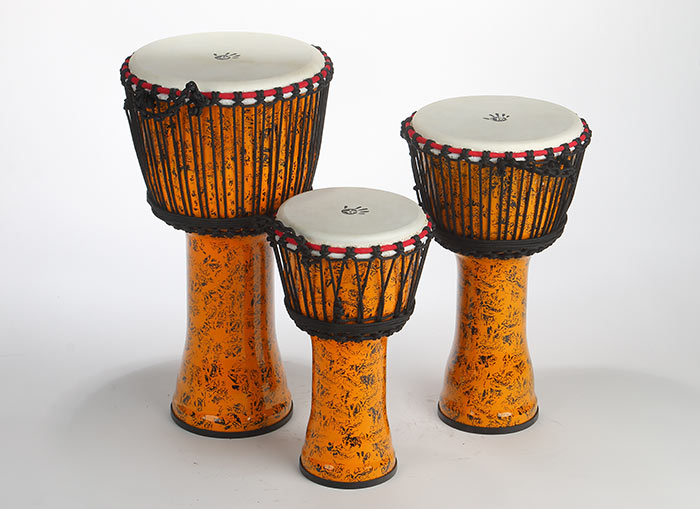The Top 5 Djembes for Beginners: A Buyer's Guide
What is a Djembe?
A Djembe is a type of drum originating from West Africa, traditionally made from a hollowed-out piece of hardwood with an animal skin stretched over the top. It is played with bare hands and produces a variety of tones depending on where it is struck. The Djembe is known for its versatile sound, used in a range of musical genres and settings, from traditional African ceremonies to modern world music performances.

Benefits of playing the Djembe
Playing the Djembe is not just fun; it also offers various benefits for beginners. Here are some reasons why getting into Djembe drumming can be advantageous:
- Stress Relief: Drumming can act as a form of stress relief and help you relax.
- Physical Activity: Playing the Djembe involves physical movements that can contribute to your physical fitness.
- Boosts Creativity: Drumming can enhance your creative thinking and expression.
- Community Connection: Joining a drumming community can help you connect with others who share your interest.
- Improves Coordination: Drumming can enhance your hand-eye coordination and motor skills.
Factors to consider when buying a Djembe
When buying a Djembe, it's essential to consider factors like the drum's size, material, sound quality, and ease of play. Here are some key points to keep in mind while making your purchase:
- Size: Select a Djembe that suits your physical stature and playing style. Smaller Djembes are easier to carry but may have less volume, while larger ones offer more resonance.
- Material: Djembes are commonly made from wood or synthetic materials. Traditional wooden Djembes provide a warm, authentic sound, while synthetic options are more durable and weather-resistant.
- Sound Quality: Listen to the sound produced by the Djembe to ensure it matches your preferences. Look for a drum with clear tones, good bass, and sharp slaps for a well-rounded sound.
- Ease of Play: Consider the drum's tuning system and skin type to ensure comfortable playing. Djembes with adjustable ropes or mechanical tuners offer flexibility in tuning, while different skin types can affect the drum's responsiveness.
Top 5 Djembes recommended for beginners
If you're a beginner looking to buy a djembe drum, you'll want to consider some popular options that cater to your skill level. Here are the top 5 djembes recommended for beginners:
- X8 Drums Beginner Djembe Jam Pack: Known for its durability and quality sound.
- X8 Drums Ramadan Djembe Bundle: For beginners and pros. Wide range of tones.
- Lava Lamp Djembe: Unique design, affordable yet offers good sound quality.
- Jackfruit Master Series: Crafted from high-quality materials for excellent sound.
- Kente Cloth Mechanically Tuned Djembe: Easy to tune. Great for beginners with its user-friendly design and reasonable price.
Comparison of the top 5 Djembes
If you're new to playing the Djembe and looking to buy one, it's essential to compare different options to find the best fit for you. Here, we'll break down the features and benefits of the top 5 Djembes for beginners to help you make an informed decision. Remember, the right Djembe for you will depend on factors like your budget, playing style, and preferences.
Djembe accessories worth investing in
When starting out with your djembe, consider investing in some accessories to enhance your playing experience. Here are a few key items to add to your gear collection:
- Djembe Bag: A sturdy bag will help protect your instrument during transport and storage.
- Djembe Strap: A comfortable strap can make it easier to carry your djembe around, especially if you plan on playing standing up.
- Djembe Stand: Having a stand for your djembe can provide stability and make it easier to play while sitting.
- Tuning Key: This tool is essential for keeping your djembe properly tuned for optimal sound quality. Tuning keys typically come with the drum when purchased.
- Djembe Skins: Consider investing in extra skins so you can easily replace them when needed for maintenance.
These accessories can complement your djembe playing experience and help you get the most out of your instrument.
Where to buy Djembes
You can find Djembes at music stores, online retailers like ours, Guitar Center or Musician's Friend, and specialty percussion shops. Check for local stores in your area that sell musical instruments.
Tips for maintaining your Djembe
To keep your Djembe in good condition, it's important to clean it regularly. Wipe the drum with a damp cloth after each use to remove dirt and sweat that can build up. Avoid exposing your Djembe to extreme temperatures or direct sunlight to prevent damage to the wood. Consider investing in a protective bag or case to transport and store your Djembe safely. Tuning your Djembe periodically is also essential to maintaining its sound quality. Lastly, if you notice any cracks or signs of damage, seek professional repair to prevent further issues.
How to get started with playing the Djembe
To start playing the Djembe, you first need to find the right drum size that fits you well. Beginners often prefer a medium-sized drum that is easier to handle. A strap can help you hold the drum while playing without tiring your arms. Once you have your Djembe, sit up straight and position the drum between your legs. Use your hands - one for the bass and one for the tone - to strike the drum. Practice different rhythms and beats to improve your skills. Joining a local drum circle or taking lessons can also boost your learning experience.
Conclusion: Find the perfect Djembe for your drumming journey
Before you make your final choice, consider your budget, preferred sound, and desired features. Each Djembe has its unique qualities, from materials used to craftsmanship. Find the one that resonates with you both in sound and style. Your drumming journey is just beginning, so pick a Djembe that inspires you to keep playing and exploring new rhythms.
Recent Posts
-
X8 Drums Play-Along Backing Tracks
The new X8 Play-Along Series is being produced for our musician friends wanting a fresh way to work …9th Feb 2025 -
What is the Best Size Djembe for Beginners?
If you're new to the world of percussion and interested in learning the djembe, you're in for a t …16th Jul 2024 -
The Benefits of Becoming a Drumming Teacher: Transforming Passion into Profession
Why become a drumming teacher? Becoming a drumming teacher is an excellent way to share your pas …22nd May 2024




